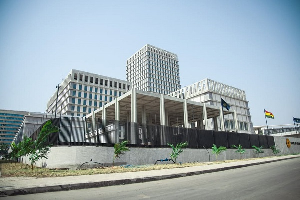Regional News of Thursday, 16 October 2003
Source: GNA
Eastern Region NADMO marks World Disaster week
Mangoase, (E/R) Oct. 16, GNA- The Eastern Regional Co-ordinator of the National Disaster Management Organisation (NADMO), Mr Seth Ahyiah has said the organisation is not a political organization as being perceived by the public.
He said it's rather a group that reacts promptly in times of disaster, and serves people irrespective of their political affiliation. Mr Ahyiah noted that due to the wrong perception the NADMO is not getting the needed support and co-operation to push it's agenda forward. He was addressing a symposium on Wednesday organized at Mangoase near Adawso in the Akuapem North District to mark the World Disaster Reduction Week celebration.
The symposium, which had the theme "Living with risk-turning tide on disaster for sustainable development" was designed to create awareness of people worldwide on how the environment could be protected from hazards.
Mr Ahyiah said the organization is a co-ordinating body working in collaboration with bodies such as the Ghana National Fire Service (GNFS) and called on the public to make the environment a happier place for all.
He advised NADMO volunteers to involve themselves in income generating activities to improve their economic lives. About 20 disaster volunteers squad from the Mangoase Secondary School was inaugurated to help in the prevention and disaster management in the area.
The Akuapem North District NADMO Co-ordinator, Mr Seth Okyere urged them to educate the people to uphold the principles of collective responsibility in disaster prevention and management.
He said NADMO is now focusing on second cycle institutions in the district because they use a lot of electrical gadgets which are potential to disaster.
Students would be encouraged to form drama groups to disseminate information on disaster prevention.
He mentioned tree planting, seminars, and clean-up exercise throughout the district as activities planned for the week. He expressed concern about building in water-ways, indiscriminate placement of structures without planning, which he described as some of the causes of disasters.












